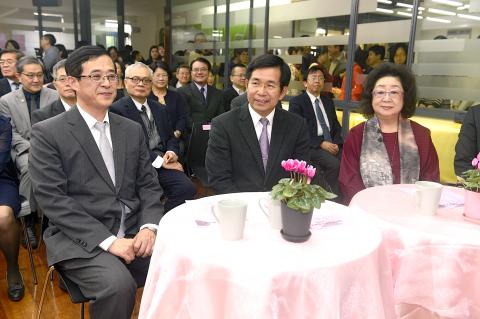Minister of Education Pan Wen-chung (潘文忠) yesterday said he returned to the ministry in the hope of completing the policies he had previously planned.
“Premier Su Tseng-chang (蘇貞昌) asked me to reassume the position because many of the policies I have planned are still in the process of being implemented and time is a bit tight at the moment,” he said after being sworn in.
“The premier says I am responsible for ensuring that the policies are successfully carried out. I know that is a huge responsibility, but I am willing to shoulder that,” he added.

Photo: George Tsorng, Taipei Times
The new 12-year curriculum guidelines, which are to take effect on Aug. 1, are a “big change for students,” he said.
He had planned the details and budgets for new textbooks, facilities and equipment required under the new guidelines and would do his best to work with schools to implement them, he said.
While former deputy minister of education Yao Leeh-ter (姚立德) is to return to teaching at Taipei National Taipei University of Technology, Deputy Minister of Education Fan Sun-lu (范巽綠), who had tendered her resignation on Sunday, would stay on in her position to help with the implementation of the guidelines, he said.
Fan has experience in compulsory education, which is a skill the ministry needs, he added.
Pan had stepped down as education minister less than a year into his term in April last year over controversy surrounding the election of National Taiwan University president Kuan Chung-ming (管中閔).
He had expressed hope that his resignation would end the political manipulations surrounding the issue that were causing “unnecessary stress and burden” to the ministry.
Following his resignation, two more education ministers stepped down over the election, while Kuan was appointed on Tuesday last week.
In response to media queries yesterday whether he felt wronged for having to step down, Pan said he did not feel that way.
“The election involved many controversies, but I felt it was a good thing that the flaws in the election system were exposed,” he said, adding that he had reviewed the system hoping to improve transparency in the election process while protecting university autonomy.
National Federation of Teachers’ Unions director-general Huang Yao-nan (黃耀南) on Sunday said that the new minister must deal with a number of pressing issues, such as the new curriculum guidelines and the transformation of private universities.
“Compared with previous curriculum changes in 2006 and 2010, this year’s changes are more extensive and require more supplementary measures and resources,” Huang said.
Having planned the curriculum guidelines, Pan is familiar with the policy, “but hopefully he would hold his ground and not compromise so easily under political pressure this time,” he added.
National Alliance of Parents Organizations chairman Hsieh Kuo-ching (謝國清) said that teachers and parents’ associations are happy to see Pan return, adding that they hope he would stay in the position until next year.
Hopefully Pan would help ensure a smooth transition for teachers and parents when the new curriculum guidelines take effect, he added.
Additional reporting by Chen Yu-fu, Rachel Lin and Wo Po-hsuan

Alain Robert, known as the "French Spider-Man," praised Alex Honnold as exceptionally well-prepared after the US climber completed a free solo ascent of Taipei 101 yesterday. Robert said Honnold's ascent of the 508m-tall skyscraper in just more than one-and-a-half hours without using safety ropes or equipment was a remarkable achievement. "This is my life," he said in an interview conducted in French, adding that he liked the feeling of being "on the edge of danger." The 63-year-old Frenchman climbed Taipei 101 using ropes in December 2004, taking about four hours to reach the top. On a one-to-10 scale of difficulty, Robert said Taipei 101

Nipah virus infection is to be officially listed as a category 5 notifiable infectious disease in Taiwan in March, while clinical treatment guidelines are being formulated, the Centers for Disease Control (CDC) said yesterday. With Nipah infections being reported in other countries and considering its relatively high fatality rate, the centers on Jan. 16 announced that it would be listed as a notifiable infectious disease to bolster the nation’s systematic early warning system and increase public awareness, the CDC said. Bangladesh reported four fatal cases last year in separate districts, with three linked to raw date palm sap consumption, CDC Epidemic Intelligence

Taiwanese and US defense groups are collaborating to introduce deployable, semi-autonomous manufacturing systems for drones and components in a boost to the nation’s supply chain resilience. Taiwan’s G-Tech Optroelectronics Corp subsidiary GTOC and the US’ Aerkomm Inc on Friday announced an agreement with fellow US-based Firestorm Lab to adopt the latter’s xCell, a technology featuring 3D printers fitted in 6.1m container units. The systems enable aerial platforms and parts to be produced in high volumes from dispersed nodes capable of rapid redeployment, to minimize the risk of enemy strikes and to meet field requirements, they said. Firestorm chief technology officer Ian Muceus said

MORE FALL: An investigation into one of Xi’s key cronies, part of a broader ‘anti-corruption’ drive, indicates that he might have a deep distrust in the military, an expert said China’s latest military purge underscores systemic risks in its shift from collective leadership to sole rule under Chinese President Xi Jinping (習近平), and could disrupt its chain of command and military capabilities, a national security official said yesterday. If decisionmaking within the Chinese Communist Party has become “irrational” under one-man rule, the Taiwan Strait and the regional situation must be approached with extreme caution, given unforeseen risks, they added. The anonymous official made the remarks as China’s Central Military Commission Vice Chairman Zhang Youxia (張又俠) and Joint Staff Department Chief of Staff Liu Zhenli (劉振立) were reportedly being investigated for suspected “serious